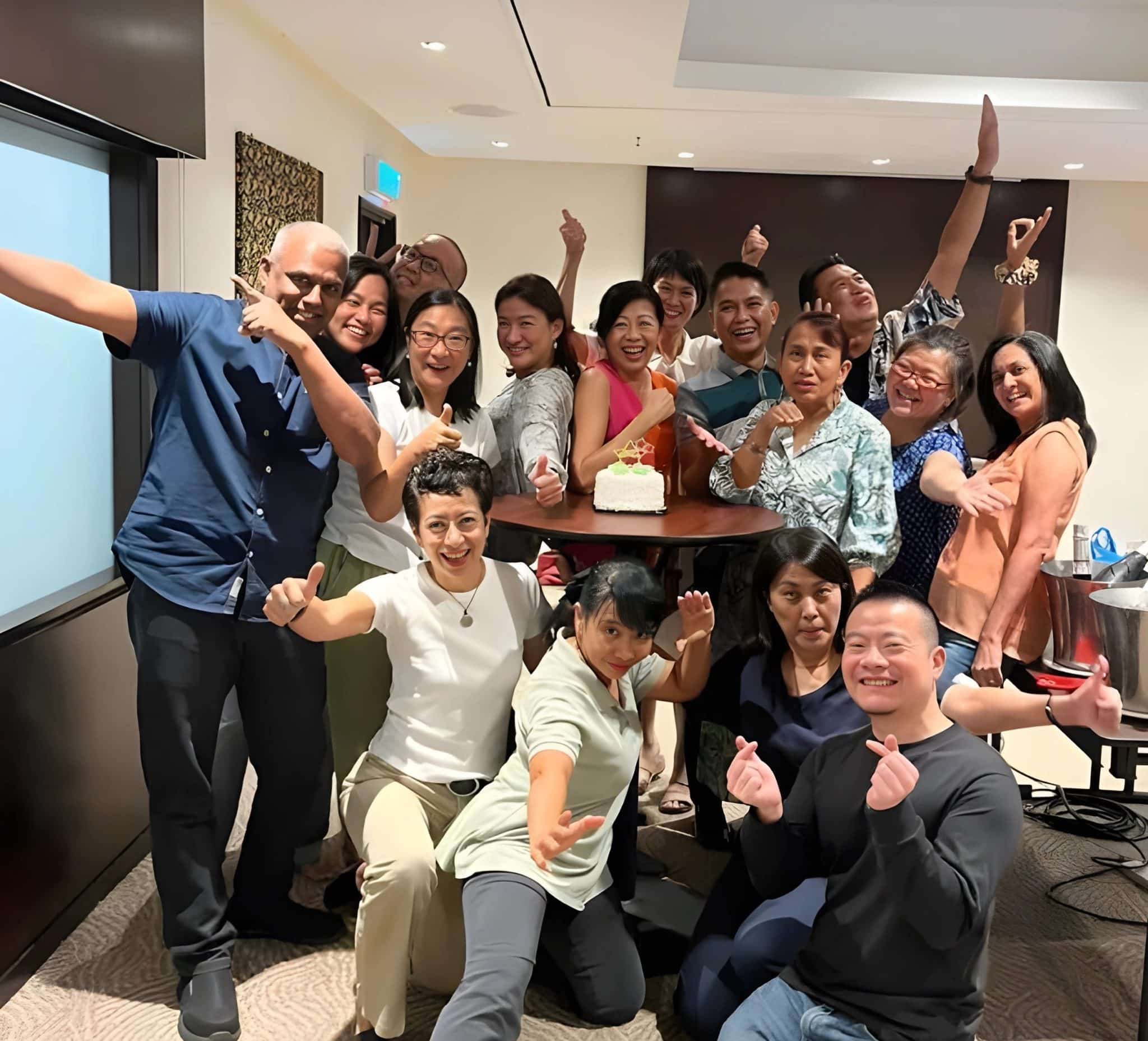“We want to help people find the joy in work”: One man’s mission to transform work as we see it
by Christine Leow // February 7, 2022, 7:34 pm
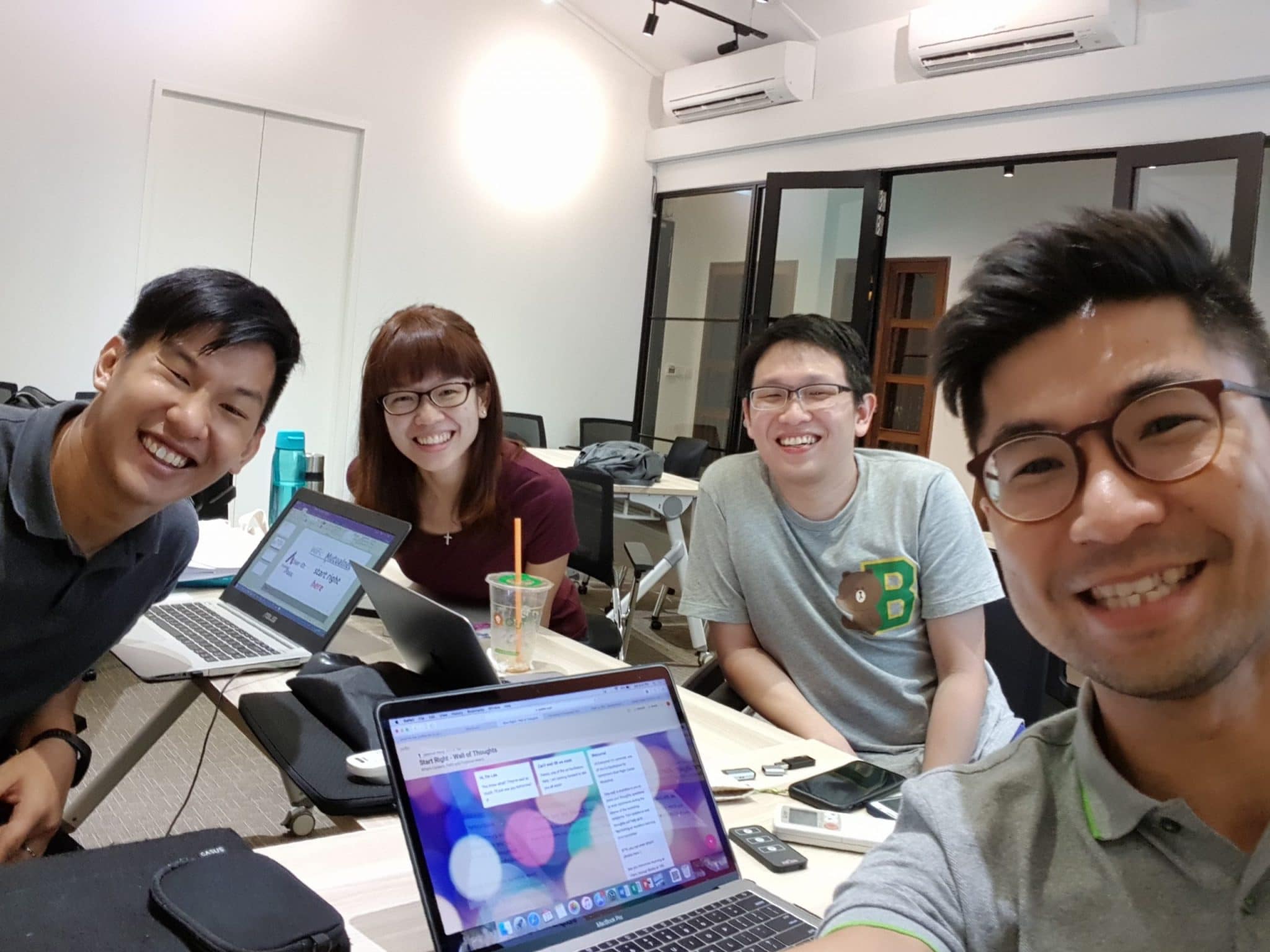
Gerald Tan (right) with his team and volunteer advisors at Avodah People Solutions in 2017. All photos courtesy of Gerald Tan.
There was a food delivery man who was so ashamed of his job that he refused to wear the company tee-shirt or buy the thermal delivery box with the company’s logo.
He would hang the customers’ orders at their doors to avoid any contact with them.
When asked why he continued in a job he so clearly disliked, his reply was: “For the money.”
But he was challenged to think about his job in a different light.
Said Gerald Tan: “The orders at night are the most profitable because people order four or five sets of food. The bigger the order, the bigger the commission.
“We could be doing the same thing but if we don’t see meaning, we will never find joy in it.”
“I asked him, ‘Who orders the food?’ He told me families.
“I said, ‘Do you realise your contribution to these families?’
“He thought for a moment then replied, ‘I’m helping families have meal times together because when they come back late, they are too tired to cook but still want to eat together.
“I am facilitating meal times so they can get enough rest and still enjoy meals as a family.’”
After that realisation, the man began to take pride in his job. He took extra care to carry the food properly, handing over the orders with a cheery “Enjoy your dinner!”
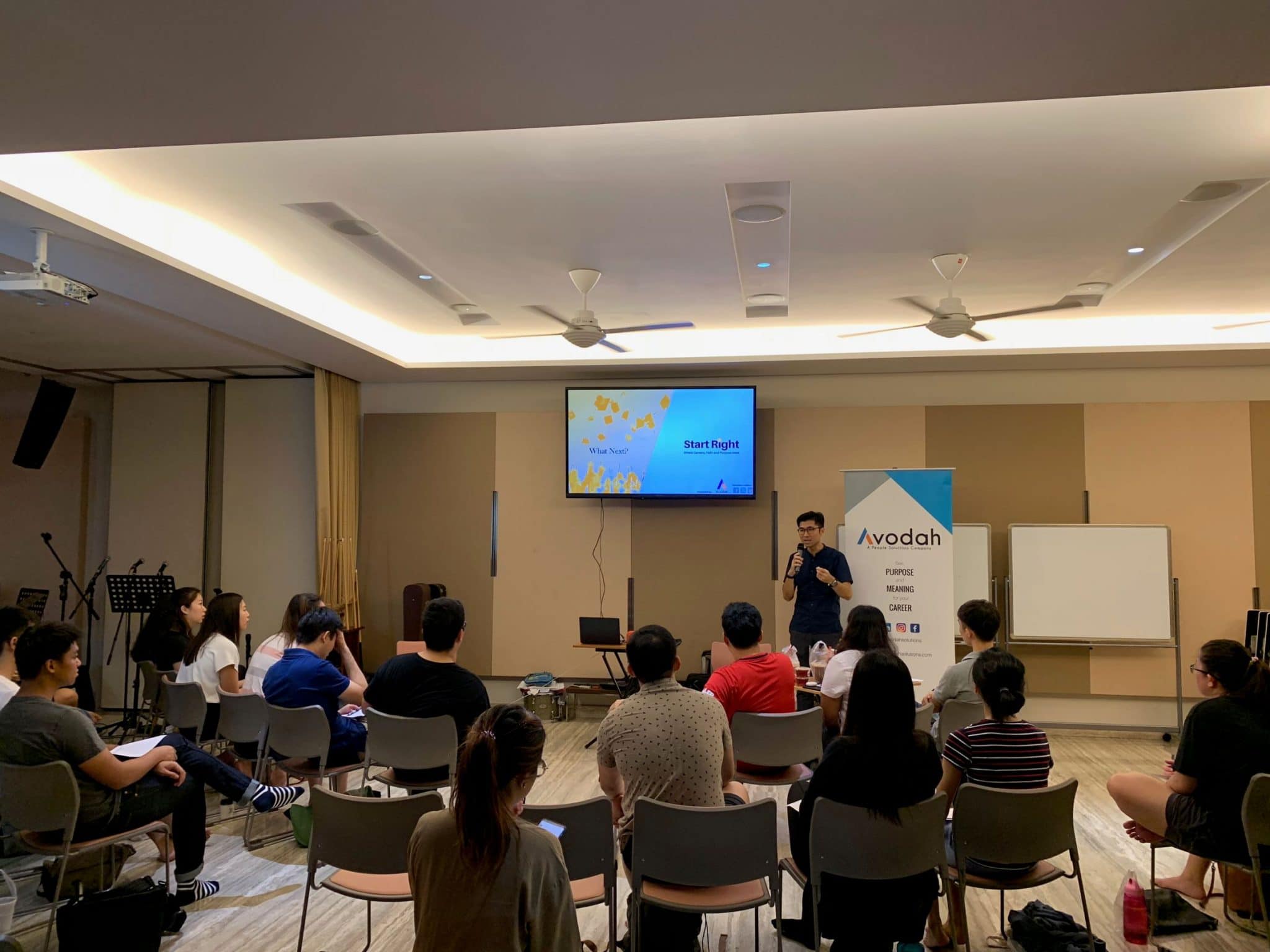
Gerald dedicates his life to helping people redefine the concept of work as merely a job that pays.
Gerald, 39, Project Director of Avodah People Solutions tells this story to underscore the importance of finding meaning in the work that we do.
“Meaning in our work can be created when we understand ourselves and how we use what we do to create meaning for others.”
“We could be doing the same thing but if we don’t see meaning, we will never find joy in it.
“Meaning in our work can be created when we understand ourselves and how we use what we do to create meaning for others.”
The company that he set up three years ago is a private career service provider that offers career guidance, helping people who have questions about career decisions or career transitions.
Underpinning the company is the firm belief that “there must be purpose and meaning behind our work” and the company is there to help people create this meaning and purpose.
But Gerald did not always have such a redemptive view of work.
The call to Sabbath rest
Baptised as a Catholic in his 20s, Gerald started attending Church of Our Saviour in 2010 because of his then-girlfriend, now wife, Clarissa.
“She was a new believer but was unable to attend church because she was the first believer in her family. But she had this amazing childlike faith and relationship with God.

Gerald and his wife Clarissa both heard the call of God to take a Sabbatical.
“I was in awe of her faith and I followed her to church. But I spent the first five years as a pew warmer. I was not serious about my faith,” said Gerald.
Then, at the start of 2015, the senior pastor of the church encouraged the congregation to ask God what He wanted them to do.
“So, I prayed. And then I heard a personal voice say, ‘I want you to leave your job.’”
“She was a new believer but had this amazing childlike faith and relationship with God.”
Never having had an encounter like this before, Gerald struggled to understand the message.
“I replied, ‘Leave my job and do what?’ And the answer was, ‘Rest in Me and I will teach you.’
“This was scary. I couldn’t understand why. I didn’t know how to respond.”
At the time, Gerald’s aim in life was “to be the youngest member of the management team in my company”. He looked to be on track to fulfil his goal, too. In six years, he had earned three promotions.
“My career goals were just about earning money. So, the idea of leaving my job and resting in God was very alien to me.”
In fact, in the effort to be better than anyone else, Gerald admitted he was “a very self-centred person” then.
“I was aggressive and relentless in the way I worked, almost like a perfectionist. I remember my reporting officer telling me that a co-worker of mine became stressed because of the way I worked.”
“My career goals were just about earning money. So, the idea of leaving my job and resting in God was very alien to me.”
For three months, Gerald considered the call, all the time wondering if he had imagined it all. When he heard nothing else, he decided to stay put in the hope of getting one more promotion.
Then, while he was on reservist in March, God spoke to him again. By then, Gerald had worked seven years. God told him he had to leave his job that year and take a Sabbath break.
God also spoke to Clarissa.
“My wife texted me at the exact same time while I was in the jungle doing my reservist. She said, ‘I think you should stop your work because it is your seventh year.’
“So, I said, ‘Okay, God. You win.’”
Clarissa left her job as well. She had asked God for His plans for her and had received confirmation that she should leave her job that same year.
Said Gerald: “For me, it was like, ‘Aiyah, You also give her a confirmation through a vision. Now, we have to take leave together.’”
The next step
The move seemed ill-timed because the couple had just received the keys to their new home and had a huge housing loan to service.
“Through serving others, we experienced the love of God for His people.”
But, with their parents’ support, they took the step of faith. They sold their car, scaled down their expenses and prepared to live off their savings.
The first day of their Sabbatical year, they embarked on a discipleship programme in their church.
“That was when we started to understand the fundamentals of what it means to be a Christian, being fully yielded to God and being missional for Christ towards others.”
They also had the time to build family relations, join their first cell group and serve in various ministries in church.

In the year he took off from work, Gerald immersed himself in various ministries in church, including community work with the elderly.
“Someone told us that we had made such a big sacrifice for our faith (because we had gone on our Sabbatical).
“But we felt it was a privilege because through serving others, we experienced the love of God for His people. We realised we were the blessed ones.”
Avodah is an ancient Hebrew word in the Bible meaning “work, worship, service”.
After a year, they became leaders of a young adult cell group. Gerald also returned to work while Clarissa did part-time jobs giving guitar lessons.
But the year away from work had transformed his perspective on life, work and money.
So, even as he returned to full-time work, Gerald started Avodah People Solutions with some good friends. The passion project which aimed to support and coach people in their careers drew on his 12 years in public service working in workforce development and unemployment.
Avodah is an ancient Hebrew word in the Bible meaning “work, worship, service”.
Two fleece
Then in 2020, Covid happened.
The pandemic not only challenged the healthcare sector, it threw the world’s economy for a loop. People began losing their jobs and Avodah started receiving calls.
“I told my wife, ‘We need confirmation. Let’s ask God for providence.”
“I realised that people needed help adapting their careers to their lives.
“Those who are unemployed may suffer from a loss of identity and self-esteem which can drive families apart and even cause self-harm.
“Those who are working but struggle between practical and aspirational situations often need clarity to decide what they should do.”
Convinced that there needed to be a new way of addressing these issues, Gerald felt the burden to turn running Avodah into a full-time job.
But it was a decision with which he “struggled with God”. Seeking confirmation, he decided to “put down two fleece” before God.

Avodah began as a passion project but soon became a full-time job although Gerald took some time to make that decision.
“I told Him, ‘If You want me and my wife to do this, help us to sell our house and buy a new place without needing a loan because if I leave my job, I won’t be able to service a loan.”
The couple did, indeed, manage to sell their flat and buy another one, paying only S$500 out of pocket for their new home.
“We can live in our new place for another 64 years without paying a single cent anymore,” marvelled Gerald.
During that season of seeking, he happened to read a Salt&Light article about The Fireplace Collective.
The founder had asked God for S$5,000 to help start the creative agency because he had no finances even though he had received God’s call to do so. God gave him S$6,000 through a friend.
“Another said, ‘God told me to give you money some time ago but I ignored it. Now, He told me to double the sum.’”
Said Gerald: “I told my wife, ‘We need confirmation (to do Avodah full-time). Let’s ask God for providence – some money, any amount.’”
Miraculously, over the next couple of days, friends and cell group members started depositing money into their account even though Gerald and his wife never told anyone about their prayer or their needs.
Recounted Gerald: “One said, ‘For your business.’
“Another said, ‘God told me to give you money some time ago but I ignored it. Now, He told me to double the sum.’”
So, in August 2020, even as the pandemic raged on, Gerald left his job to run Avodah full-time.
On his team are six freelance associates personally trained by Gerald to run the programme he developed. Although Avodah is a faith-based company run on Biblical principles, the programme itself is not Christian, and Gerald hires and helps people of various faiths.
Work as God intended
One of the things Gerald does through his company is to help people see work as God designed it.
“Meaning is created when we can see how God uses the broken parts of our lives to become a driving force for our work.”
“The original concept of work was instituted in the Bible in Genesis 1 where God commanded Adam to take dominion and multiply.
“Even with the Fall in Genesis 3 when work became toil, Jesus’ sacrifice redeemed man and restored all things including work to Himself.”
As a result, work is not just a job but a mission for man to manage and grow resources as God had planned. When work has this greater purpose beyond fulfilling practical needs, it has meaning and becomes enjoyable.
“As Christians, the meaning is created when we can see God’s purposes in us being fulfilled through our works when we are able to use our talents for a missional purpose.
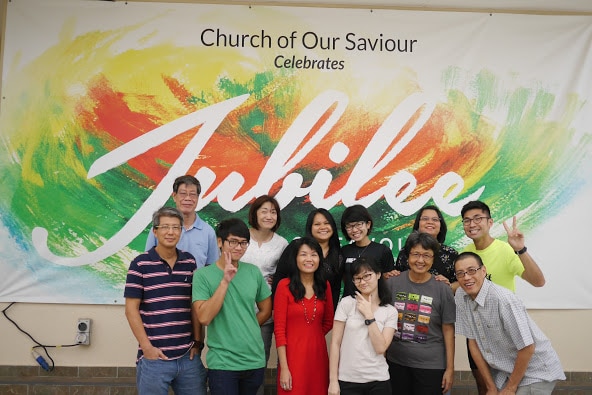
Gerald (in yellow) with his discipleship group at Church of Our Saviour.
“The meaning is also created when we can see how God uses the broken parts of our lives to become a driving force for our work.”
Helping his clients discover their purpose in life then is vital. Instead of identifying with their job titles, he gets people to identify with what they are good at.
“We should be looking for a job that fits what we are good at and not have us fit into the job.”
“Work should be viewed as an output of time, not as a role or a title. Anyone, from a home-maker to a CEO can make their work meaningful.
“Are you good at numbers or at getting information out of people, or being accurate and precise?
“Some people work 20 years but when you ask them, ‘What is your skillset, what can you do?’, they are unable to say because they have never reflected on it.
“We should be looking for a job that fits what we are good at and not have us fit into the job, or we will be relying on the job to make us happy.”
Turning trauma into true purpose
Avodah also helps people navigate transitions in life.
“When you graduate from school, that is one transition. When you get fired from a job, fall ill, get married – these are all life events, some expected and some unexpected.
“If we don’t manage them well, they become pressure points.”
Gerald helped the man see how “the hurts in his past created repeated themes and narratives across his life”.
These pressure points can lead to a desire to change jobs without the ability to handle the change smoothly.
“When people ask, ‘Should I quit my job? But I have financial commitments, what should I do?’ We help them make informed decisions.”
Beyond job decisions, Gerald helps his clients deal with the underlying causes of their discontent.
He tells of one client who has had 11 jobs in eight years. When he sees a resume like that, he looks deeper into the cause.
“Sometimes, it could be personal issues that are brought into the work place.
“If they are not addressed, a pattern is formed till they become disappointed and exit the workforce as discouraged workers – people who don’t feel like they want to work.”
In the last year or so, Gerald has helped some of his clients turn their trauma into true purpose.
One of them had grown up ridiculed by classmates because he was overweight and often felt self-conscious in front of others. He helped the man see how “the hurts in his past created repeated themes and narratives across his life”.
“Because of that, he was able to formulate a clear purpose for himself: To help misfits fit in.”
“We want to redeem the concept of work and help people find joy in working.”
At work, the man reaches out to those who are awkward and supports those struggling.
In church, he noticed there were people who did not fit into any cell groups. He started one for them and is now helping to lead this new young adult cell group.
He has also turned his struggles with his health into a possible business. He is particularly interested in plant-based foods and wants to start a private dining business for people with unique dietary restrictions.
“Such stories encourage us in doing what we do. We want to redeem the concept of work and help people find joy in working.”
When the trauma is too deep, as was the case with another client who could not hold down a job because being spoken to harshly triggered childhood hurts, Gerald channels them to professional counsellors.
The providence of God
Running Avodah has not been easy. Career advice abound on the Internet and the government offers help for free.
“God is teaching us to do a new thing and to rely on Him to do so.”
“So, why are we doing it? God is teaching us to do a new thing and to rely on Him to do so.
“It has been a long one-and-a-half years walking with God.”
Yet every time Gerald complains, he is reminded of how God has been sustaining the business. For a while, government grants kept him going. When that ended, he told God he would fully depend on Him.
That’s when business doubled even though Gerald did no marketing.
“The running joke is that whatever I plan tends to fail. Whatever lands on my lap tends to work.
“I believe there is a deeper lesson God is teaching me – not being self-made and self- sufficient but to lean on Him for every single thing.
“Providence comes from God. Our work is to God.”
“I’m reminded of Moses leading the people out of Egypt. The Israelites complained, ‘I want the fish and meat of our former lives.’
“But God kept leading them out, never stopped giving to them. He was always there.”
Running his own business has also given Gerald more time to spend caring for his cell group, a benefit he recognises but over which he sometimes wrestles with God.
“I see God redefining my own understanding of my work. My work is beyond Avodah. It includes my marriage, my family, my friends, my cell group ministry and more.
“There are days when I don’t seem to be doing anything related to Avodah because I have to attend to my family or my cell group or church. I feel lousy because that time could have been better used for a more direct impact on the business and my own income.
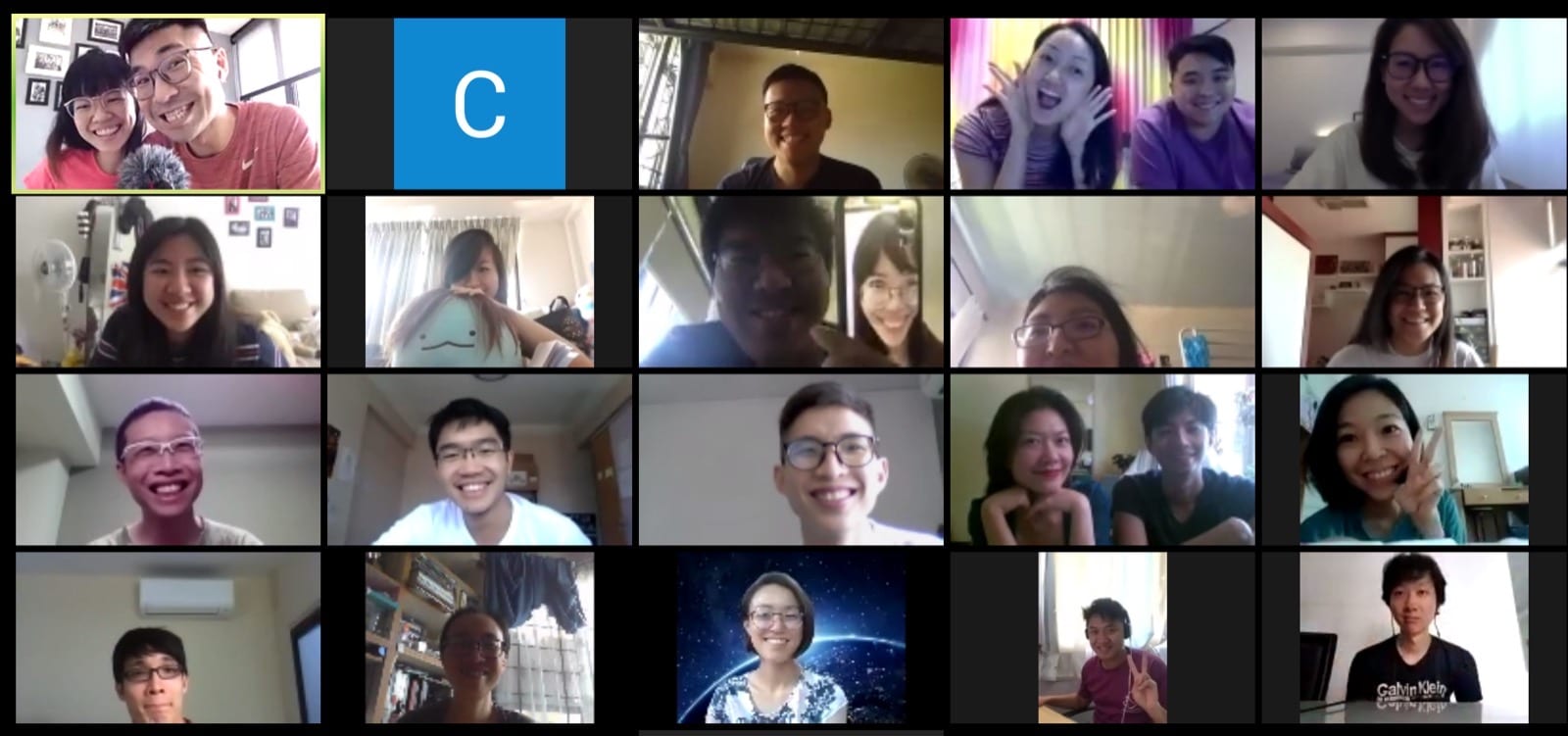
Running Avodah has given Gerald and Clarissa (top left) time to grow their young adult cell group, something that Gerald now sees as work as well.
“I asked God, ‘Why are you asking me to do things that don’t earn money? Did you forget my needs?’”
Then, Gerald came across another Salt&Light article. This one related the story of a couple who miraculously managed to buy a flat for very little money.
“That article spoke to me. The gentleman in the story talked about how we have to delink our providence from our work.
“Providence comes from God. Our work is to God. I was linking the way I spent my time with the amount of money I earned. I omitted God when it is God who provides me with the money.
“I see God redefining my own understanding of my work.”
“So, this realignment from the article helped me to see that, even when I don’t seem to be doing anything for Avodah, I am still working for God because the young adults cell group is very important to Him.
“There should be no segregation between work and ministry. It is supposed to flow together.”
As the interview comes to a close, Gerald shares another account of God’s timing and leading.
He had met Salt&Light in 2018 to talk about an article featuring Avodah.
“But I felt it wasn’t the right time. I felt sad about it because who doesn’t want the exposure?
“I prayed, ‘If You want to open the door for us, open the door for us.”
Three years later, Salt&Light approached him.
RELATED ARTICLES:
More S’poreans, particularly young adults, declare they have no religion: 2020 population census
We are an independent, non-profit organisation that relies on the generosity of our readers, such as yourself, to continue serving the kingdom. Every dollar donated goes directly back into our editorial coverage.
Would you consider partnering with us in our kingdom work by supporting us financially, either as a one-off donation, or a recurring pledge?
Support Salt&Light

